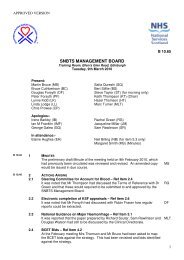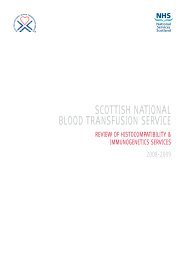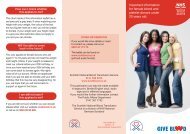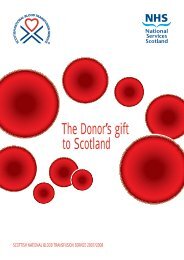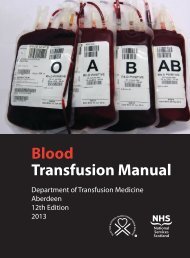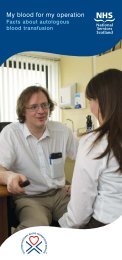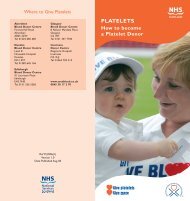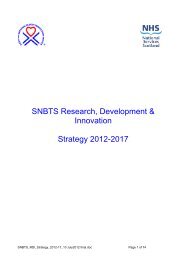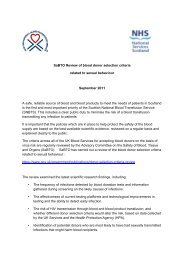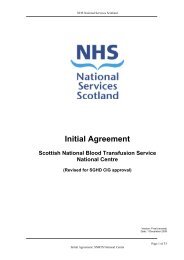SNBTS Tissue Doner 8pp 9739:NHS Tissue Doner 8pp 9582
SNBTS Tissue Doner 8pp 9739:NHS Tissue Doner 8pp 9582
SNBTS Tissue Doner 8pp 9739:NHS Tissue Doner 8pp 9582
You also want an ePaper? Increase the reach of your titles
YUMPU automatically turns print PDFs into web optimized ePapers that Google loves.
<strong>Tissue</strong> Donation<br />
Saving lives...changing lives
<strong>Tissue</strong> donation – a life changer and saver<br />
Imagine your child was born with a heart problem, and the<br />
only answer was a donated heart valve, or you have a bad<br />
accident and urgently need a bone graft. You probably would<br />
not hesitate to make use of these medical marvels, but have<br />
you ever thought about the donors who make such<br />
operations possible? They are people who have thought<br />
about what they would like to happen after their death, and<br />
decided they would like to help other people in perhaps one<br />
of the most meaningful and lasting ways possible. They are<br />
tissue donors, in other words they have decided to allow<br />
some of their tissues to be donated after their death so that<br />
others can benefit.<br />
Katy<br />
Katy was born with a serious heart condition, she was<br />
so sick that her parents were told that she would not<br />
survive the next 48 hours.<br />
She did survive and at nearly two years old she<br />
underwent a heart valve transplant. Now Katy is a<br />
bubbly, energetic three year old.<br />
Katy's mum, Kim, said, “Somebody else made a<br />
decision to donate their tissues, which in turn saved<br />
Katy's life. I cannot thank them<br />
enough.”
Nicky<br />
Nicky, a 29 year old electrician, sustained extensive<br />
burns to his hands and face when he was electrocuted<br />
with 11,000 volts.<br />
His burns needed to be covered immediately with<br />
donor skin to help the healing process begin and<br />
preserve as much of his own skin as possible.<br />
Nicky says, "I cannot express the amount of gratitude<br />
I have for the families who made it possible for me to<br />
receive the donated skin, which has helped me to<br />
return to normal life.”<br />
What is tissue donation?<br />
Every year hundreds of lives are saved with the help of<br />
donated organs such as hearts and kidneys. But you may not<br />
realise that donated tissues such as heart valves, tendons, skin<br />
and corneas can dramatically improve the quality of life for<br />
recipients, and even save lives.
Who can donate?<br />
Some tissues can be donated during life, such as bone<br />
removed as part of a routine surgical procedure which<br />
otherwise would have been discarded. Other tissues are<br />
donated after death, by people who have expressed a wish<br />
during their lifetime to help others in this way. Often they<br />
are registered on the Organ Donor Register or have discussed<br />
their wishes with their family.<br />
Many people can be considered for tissue donation after<br />
death, as some tissues can be donated up to 48 hours<br />
after a person has died. The tissues donated by one donor<br />
may enable up to ten people to benefit from tissue<br />
transplant surgery.<br />
Everette<br />
Everette, a 32 year old teacher, had a serious eye<br />
condition that would eventually lead to blindness.<br />
To restore his sight Everette had to<br />
have two cornea transplants.<br />
"The transplants have given<br />
me both my sight and my life<br />
back. I can see my children's<br />
faces again and so much is<br />
now possible. It is not only<br />
me that has benefited, my<br />
whole family shares it with me<br />
and I am able to carry on<br />
teaching, thanks to the<br />
kindness of others."
Chris<br />
Chris, a keen sports man, damaged the ligaments in<br />
his knee whilst snowboarding. A donated tendon was<br />
used to replace the ligament. Within six months<br />
Chris was back playing tennis and snowboarding<br />
a year on.<br />
"I know that the transplant was not life-saving but it<br />
is the difference between living and loving life. My<br />
knee feels stronger today than before the accident,<br />
I am lucky to have been given this opportunity."<br />
Can anyone donate tissues?<br />
Discussing your wishes with your family, joining the organ<br />
donor register and carrying a donor card are important steps<br />
to take. At the time of your death, they make it easier for the<br />
subject of tissue donation to be raised and discussed. Many<br />
people can be considered for tissue donation following death.<br />
In order to ensure that donated tissues are as safe as possible,<br />
the donor’s medical and behavioural history is reviewed in a<br />
similar way as that of blood donors. This reduces the risk of<br />
transmitting disease to a patient. A blood sample is taken<br />
from the donor and tested for viruses including HIV and<br />
hepatitis. Family interviews are carried out by specially trained<br />
<strong>Tissue</strong> Donor and Donor Transplant Co-ordinators, who try to<br />
carry out the wishes of the donor and their family.
Why donate?<br />
<strong>Tissue</strong> transplantation offers huge benefits to many people,<br />
relieving their pain, helping them to see, or walk again, or<br />
return to work. A tissue transplant can even save lives.<br />
Donation of tissues, especially in cases when organ donation<br />
is not possible, can offer the opportunity for families to fulfil<br />
their loved one’s wishes. Many bereaved families take comfort<br />
in the knowledge that their loved one has helped others in<br />
this way.<br />
What tissues can be donated after death?<br />
Many kinds of tissues can be donated after death.<br />
These include:<br />
Heart valves can be transplanted to save the lives of<br />
patients, including young children born with deformed<br />
hearts, or suffering from diseased or damaged valves.<br />
Tendons can be used to restore mobility in patients with<br />
badly damaged knee joints, usually following sporting injuries.<br />
Corneas can be transplanted into patients suffering from<br />
severe eye disease or injury. Sometimes the sclera, the white<br />
outer coat of the eye, is also transplanted during<br />
reconstructive eye surgery.<br />
Skin can help save the lives of severely burned victims, but it<br />
can take many donations of skin to treat just one such patient.<br />
Other tissues may be donated in specific circumstances<br />
depending on clinical requirements.<br />
Can tissues be donated just for<br />
medical research purposes?<br />
It is sometimes possible to donate tissues just for medical<br />
research. But only if that is the express wish of the donor<br />
and their family.
Martyn<br />
Martyn<br />
Martyn was a genuine, caring, fun-loving and gifted young<br />
man with a lot to look forward to. At just 24 years old, his life<br />
ended suddenly in a road traffic accident. In the hours after<br />
his death his family kindly offered to help<br />
others through donation.<br />
"Martyn had a donor card since he was<br />
nine years old and I am glad that he<br />
was able to be a donor. The fact that<br />
our loss helped so many others has<br />
brought us some comfort. He was simply<br />
the best," said his mum, Maureen,<br />
pictured above with the rest<br />
of the family.<br />
His girlfriend Vicki<br />
added, "Martyn<br />
would have<br />
helped anyone,<br />
and I am proud<br />
that he carried<br />
on doing that<br />
after he died."
I’d like to help, what should I do?<br />
Tell your family<br />
If you would like to help others after your death, please make<br />
your wishes known to your family or next of kin.<br />
Join the <strong>NHS</strong> Organ Donor Register<br />
You can register with the <strong>NHS</strong> Organ Donor Register<br />
by calling 0300 123 23 23.<br />
Carry a Donor Card<br />
Visit www.organdonation.nhs.uk to get a Donor Card<br />
and enter your details on the register.<br />
Contact details<br />
Tel. 0845 90 90 999<br />
or visit<br />
www.scotblood.co.uk<br />
This publication can also be made available in<br />
large print, braille (English only),<br />
audio tape and in different languages.<br />
If you would like further information contact<br />
The Public Affairs Department<br />
Tel. 0141 357 7752<br />
Ref. No. TSD LFT 001<br />
Version 02<br />
Date Published 11/10



